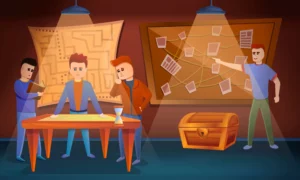For adults, escape rooms are full of intense and complex challenges with one goal: to achieve freedom. Some people may think that adding children in these rooms could seem out of place or unnatural. However, children can also have as much fun in escape rooms just like any other party game.
Playing games is a natural way to teach children different concepts and develop certain skill sets. This is evident from the earliest toys they’ll own, from Lego blocks to simple jigsaw puzzles. Escape games are just a step above the interactivity that children can experience as a way to learn and have fun simultaneously.
Today’s generation of growing youths
With modern technology in the mix of raising children, the growing youth is more open to different forms of interactive learning. Apps that allow out-of-the-box thinking from pulling levers, tilting screens, and scanning objects are the modern ways to engage children. For this reason, escape games can be a real-life translation of these complex puzzles into 3D spaces.
If you’re still reluctant about letting your child play in an escape room, here are three reasons to convince you otherwise:
Escape rooms have themes that are children-friendly
One recurring fear of parents who are afraid to let their children join escape rooms are its themes. Some of the more popular themed rooms take inspiration from horror films and novels, with some places featuring live actors dressed in full homicidal murderer gear. However, not all escape games follow this format.
There are themed rooms that follow a more “mystery” than “horror” vibe, which is perfect for children of all ages to try out. Although rooms may still require adult supervision, it can be an exciting experience for your child’s group of friends to be their own detectives in these escape games.
Escape rooms are excellent teaching environments
Escape rooms are supposed to be complex puzzles that do require more than your standard classroom lessons to solve. Although some puzzles involve coded messages and numerical computations, others require other skill sets like spatial recognition or memory recall. These are essential qualities to develop that academic institutions don’t really have a curriculum for, even though it’s present in many subjects, like engineering, history, and more. For this reason, escape rooms can provide an alternative learning environment to further your children’s growth.
Escape rooms develop soft skills in children
Besides figuring out different puzzles and patterns, escape rooms also develop your child’s soft skills. Your child will encounter different social scenarios as they grow up, requiring them to act as an individual or coordinate with a group. Escape room games are perfect environments for them to test out how well they can communicate information and develop solutions as a team.
The best part about playing escape room games is that they don’t have to win it to learn its many lessons. In fact, not succeeding the first time around is a lesson on its own. It can inspire a level of competitive spirit in accepting how well they progressed with every attempt in the same room. Going through these trials will lead to a more rewarding experience when they conquer the room after many tries.
Conclusion
Spending an hour or two playing escape room games is an overall fun bonding experience for the whole family. Beyond its many teaching benefits, escape rooms are also just a good time for them to have an exciting time.
Want to bring your kids to a one-of-a-kind escape room in Bradenton, FL? We at Premier Escape Adventures can give you and your kids an immersive experience you won’t forget! Book a session with us today to test your ingenuity and intellect by trying out our different themed rooms!



